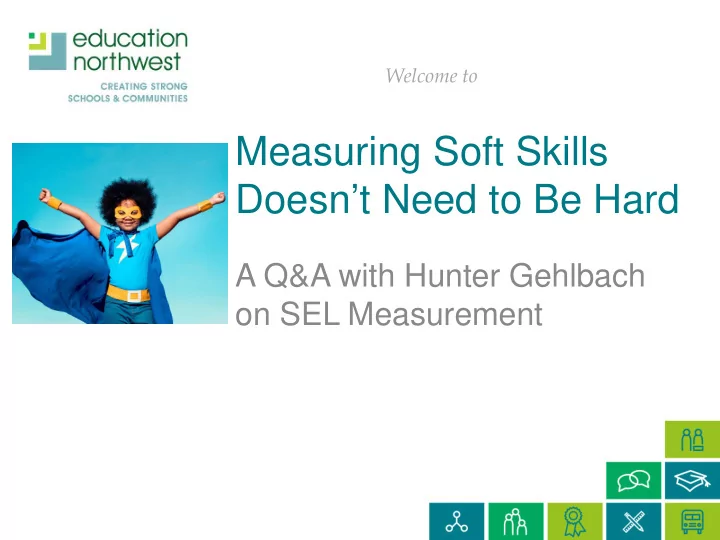

Welcome to Measuring Soft Skills Doesn’t Need to Be Hard A Q&A with Hunter Gehlbach on SEL Measurement
Poll Question: Where are you in the SEL measurement process? a. SEL? What’s SEL? b. Early – just starting to consider it c. Midway – have a measure selected and are planning to start collecting data soon d. Late – the SEL data are already rolling in
Poll Question: Why are you considering collecting SEL data? a. To learn where the kids I work with are struggling in terms of their SEL b. To learn if the kids I work with have grown in terms of their SEL c. To compare the SEL skills of students in the schools/programs I work with d. Other – please describe in the chat
Agenda Welcome and introductions Measuring Social and Emotional Learning: A Brief Guide Using SEL measures for formative purposes Audience Q & A Close
Today’s Speakers Hunter Gehlbach Karyn Lew is Panorama Education Education Northwest
Academic Success
Content Knowledge Academic Success Academic Skills
Content Social Knowledge Skills Self- Efficacy Emotional Academic Competence Success Academic Skills Self- Regulation
Content Social Knowledge Skills Self- Efficacy Emotional Academic Competence Success Academic Skills Self- Regulation
Terminology for the “Other Stuff” What to call the “other stuff”? • Social-emotional learning (SEL) • Non-cognitive or non-academic skills • 21st century skills • Mindsets, essential skills, and habits (MESH)
Terminology for the “Other Stuff” What to call the “other stuff”? • Social-emotional learning (SEL) • Non-cognitive or non-academic skills • 21st century skills • Mindsets, essential skills, and habits (MESH)
Why the Confusion? “It is a very diverse group of factors and the reason it’s been hard to come up with a name is that they don’t necessarily belong together.” Dr. Carol Dweck
Toolkit for School Success
Home environment/ Content neurobiology Knowledge Self- Efficacy Emotional Academic Competence Success Academic Skills Self- Regulation
Home environment/ Content neurobiology Knowledge Self- Efficacy Emotional Academic Competence Success Academic Skills Self- Regulation School Context
Implications for Measurement The Every Student Succeeds Act (ESSA) requires schools to track at least one “non-academic” measure of school quality or student success Opened up unprecedented opportunity for schools to consider success more broadly, and many schools proposed using SEL as a potential indicator
Implications for Measurement
Summary of Controversy • There’s no standard benchmark of healthy SEL development and therefore no appropriate way to “grade” kids or schools • Might be possible to “game” the surveys • An annual assessment isn’t likely to give you actionable data for interventions
What to Make of the Controversy? SEL measures, like all measures, are flawed “All measures suck, and they each suck in their own way.” Angela Duckworth
And Yet … SEL is important, and formative information about students who are struggling can be useful for schools
SEL Measurement Guide Distill key decisions for implementing SEL measurement projects Promote the collection of high-quality SEL data that are robust and actionable
SEL Measurement Guide 1. Clarify the purpose for measuring
SEL Measurement Guide 1. Clarify the purpose for measuring 2. Decide which constructs to measure
SEL Measurement Guide 1. Clarify the purpose for measuring 2. Decide which constructs to measure 3. Select the appropriate tool
Questions for Dr. Gehlbach Hunter Gehlbach Director of Research Associate Professor, UCSB
How do you define SEL? What advice can you give for selecting SEL capacities to measure?
What do you think about the possibility of measuring SEL? What are the goals of the measurement process?
When is it best to survey students? When is it best to survey teachers and other adults?
How do SEL measures relate to climate surveys? What can you learn from one type of data that you can’t from the other?
What keeps you up at night when it comes to SEL measurement?
Do you have a favorite SEL measurement success story?
What are the most pressing future challenges for the field of SEL measurement to tackle?
Audience Q & A
Want to Learn More? Are you ready to assess social and emotional development? American Institutes for Research Assessing social & emotional skills in out-of-school time settings: Considerations for practitioners Blyth, D., & Flaten, K. (2016). University of Minnesota Extension Encouraging social and emotional learning in the context of new accountability Melnick, H., Cook-Harvey, C. M., & Darling-Hammond, L. (2017). Learning Policy Institute Practical measurement Yeager, D., Bryk, A., Muhich, J., Hausman, H., & Morales, L. (2013). Carnegie Foundation for the Advancement of Teaching Measurement guide Coming soon from CASEL’s work group on SEL measurement
Let’s Chat: How are you seeing SEL surveys being used in the field?
Thanks for Coming - Stay in Touch! Hunter Gehlbach Karyn Lew is karyn.lewis@educationnorthwest.org gehlbach@ucsb.edu
Contact Us educationnorthwest .org Education Northwest educat ionnort hwest @ 101 SW Main Street Suite 500 @ educationnw Portland, OR 97204-3213 1.800.547.6339
Recommend
More recommend